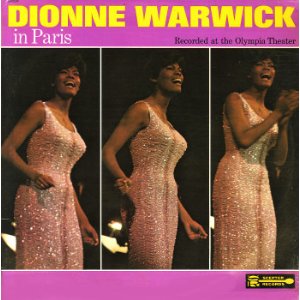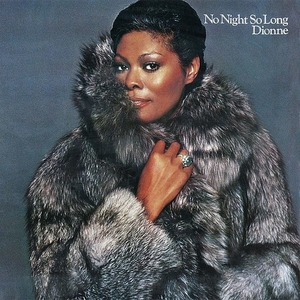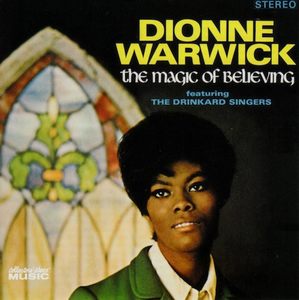
Soulful is the twelfth album by Dionne Warwick. Released in 1969 on Scepter Records, it was the first of Warwick's Scepter albums that did not directly involve her longtime production and songwriting team of Burt Bacharach and Hal David. Instead, the album was produced by Warwick and Chips Moman and was composed of covers of soul hits and soul-influenced pop songs.

Lady Sings the Blues is the soundtrack to the Billie Holiday biopic of the same name, which starred Diana Ross in her 1972 screen debut. It became Ross' first #1 album, though the only one as a solo artist. It was certified gold in the UK for sales of over 100,000 copies. It was the fourth best-selling R&B album and fifth best-selling Pop album of 1973 in the US.

"One Love in My Lifetime" is a song recorded by American singer Diana Ross, taken from her 1976 second self-titled album, Diana Ross. The song was written by Lawrence Brown, Leonard Perry and Terri McFadden, produced by Brown and arranged by Wade Marcus.

"Sorry Doesn't Always Make It Right" is a song recorded by American singer Diana Ross in 1975. The song was written by Pam Sawyer and Michael Masser, the latter also produced the recording.

"No One Gets the Prize" is a song recorded by American singer Diana Ross for her 1979 album The Boss. The song was written and produced by Nicholas Ashford and Valerie Simpson.

Make Way for Dionne Warwick is the third studio album by American singer Dionne Warwick. It was released by Scepter Records on August 31, 1964 in the United States. Propelled by the hit singles "Walk on By," "You'll Never Get to Heaven," and "Wishin' and Hopin'", it became Warwick's first album to enter the US charts, reaching the top ten of Top R&B/Hip-Hop Albums.

Here Where There Is Love is Dionne Warwick's sixth studio album for Scepter Records, and was released on December 4, 1966. The album was recorded at Bell Sound Studios in New York City and was produced in full by Burt Bacharach and Hal David with Bacharach also arranging and conducting.

Dionne Warwick in Paris is Dionne Warwick's sixth album, and was released on April 14, 1966 on Scepter Records. It was recorded during Warwick's five-week engagement at the Paris Olympia in January 1966 and was released shortly after the tour was completed. The LP was issued as number 534 in the Scepter Catalog. The liner of this LP is pink with three pictures of Warwick side-by-side, not unlike the Make Way for Dionne Warwick album two years earlier.

On Stage and in the Movies is Dionne Warwick's seventh album for Scepter Records, and was recorded and released in May 1967. The LP was issued as number 559 in the Scepter Catalog.

Dionne is a studio album by American singer Dionne Warwick. It was released by Arista Records in May 1979 in the United States. Recorded during the winter of 1978–79, the album marked Warwick's debut with the label. Production on Dionne was helmed by Barry Manilow, who was paired with Warwick by Arista founder Clive Davis. Her highest-charting album since Soulful (1969), Dionne peaked at number 12 on the US Billboard 200 album chart and went platinum in the US.

No Night So Long is a studio album by American singer Dionne Warwick. It was released by Arista Records on July 18, 1980, in the United States. Her second album for the label, Warwick worked with producer Steve Buckingham on the album which was recorded during the spring of that year.

Hot! Live and Otherwise is a combination live and in-studio album by American singer Dionne Warwick, released in 1981 on Arista Records. The LP was originally issued as number A2L 8605 in the Arista Catalog.

Promises, Promises is the title of a 1968 album by Dionne Warwick, and her eleventh studio album. Like many of her previous albums, it was produced by the songwriting team of Burt Bacharach and Hal David. The album includes three songs from the musical Promises, Promises, for which Bacharach and David wrote the music and lyrics, and which would premiere a month after the album was released: the title song, "Whoever You Are " and "Wanting Things". The album also includes two other Bacharach/David compositions, "This Girl's in Love with You" and "Who Is Gonna Love Me".

I'll Never Fall in Love Again is the thirteenth studio album by American singer Dionne Warwick, released on April 27, 1970 by the Scepter label. It was produced by Burt Bacharach and Hal David. In 1971, the album won the Grammy Award for Best Female Pop Vocal Performance.

Very Dionne is the fourteenth studio album by American singer Dionne Warwick, released in 1970 on the Scepter label. It was produced by Burt Bacharach and Hal David. It would be her final album recorded with Scepter before signing with Warner Bros. Records.

The Magic of Believing is the tenth studio album by American singer Dionne Warwick. It was released in 1968 on Scepter Records special for Easter. The singer recorded this album entirely in the genre of gospel music. The band Drinkard Singers, which included Warwick's closest relatives, took part in the recording of the album.

Dionne is a studio album by American singer Dionne Warwick. It was released by Warner Bros. Records in January 1972 in the United States. Her debut with the label following her departure from Scepter Records after the release of Very Dionne (1970), it features production by Burt Bacharach, Bob James, and Don Sebesky. Her lowest-charting album in years, it peaked at number 54 on the US Billboard 200, her highest peak during her stint with Warner Bros. Records.

Track of the Cat is a studio album by the American singer Dionne Warwick. It was released by Warner Bros. Records in 1975 in the United States. Her second album to be released that year, it peaked at number 137 on the US Top LPs & Tape chart.

"Married Men" is a song written by Dominic Bugatti and Frank Musker. It was recorded and released almost simultaneously by Welsh singer Bonnie Tyler and American Bette Midler. Due to the simultaneous release, both versions competed with each other. As a result, Tyler's version reached number 35 in the UK, while Midler's version charted in North America, including number 40 in the US Hot 100.

"My Mother's Eyes" is a song by American singer Bette Midler, taken from her 1980 live album Divine Madness. The song was released as a single in November of the same year with the song "Chapel of Love" on the flip side. It reached number 39 on the Billboard Hot 100 and number 8 on the Adult Contemporary chart.




















